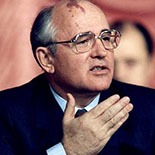 Mikhail Sergeyevich Gorbachev (born March 2, 1931) is a former Soviet statesman.
Mikhail Sergeyevich Gorbachev (born March 2, 1931) is a former Soviet statesman.
He was the eighth and last leader of the Soviet Union, having served as General Secretary of the Communist Party of the Soviet Union from 1985 until 1991, and as the country’s head of state from 1988 until its dissolution in 1991 (titled as Chairman of the Presidium of the Supreme Soviet from 1988 to 1989, as Chairman of the Supreme Soviet from 1989 to 1990, and as President of the Soviet Union from 1990 to 1991). He was the only general secretary in the history of the Soviet Union to have been born after the October Revolution.
Gorbachev’s policies of glasnost (“openness”) and perestroika (“restructuring”) as well as summit conferences with United States President Ronald Reagan and his reorientation of Soviet strategic aims contributed to the end of the Cold War, removed the constitutional role of the Communist Party in governing the state, and inadvertently led to the dissolution of the Soviet Union. He was awarded the Otto Hahn Peace Medal in 1989, the Nobel Peace Prize in 1990 and the Harvey Prize in 1992, as well as honorary doctorates from various universities.
“I do not regard the 1990 Nobel Peace Prize as an award to me personally, but as a recognition of what we call perestroika and innovative political thinking, which is of vital significance for human destinies all over the world.”